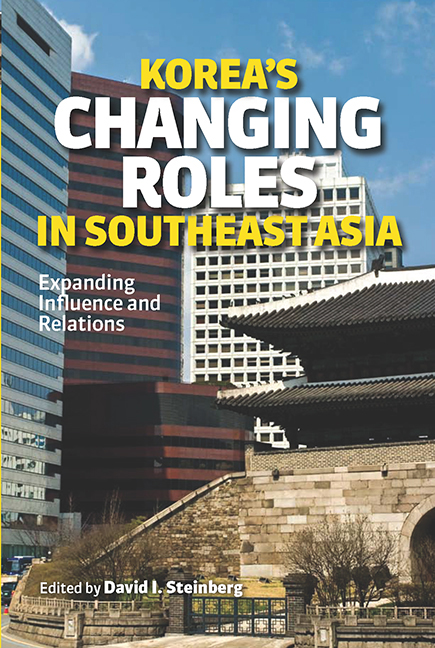Book contents
- Frontmatter
- Contents
- List of Tables, Figures and Photos
- Foreword
- Message
- Acknowledgements
- The Contributors
- 1 Tenuous Beginnings, Vigorous Developments
- 2 Perspectives on Korea's Role in ASEAN
- 3 South Korea and Southeast Asia: Ideas for Deepening the Partnership
- 4 Divergence Amidst Convergence: Assessing Southeast and Northeast Asian Security Dynamics
- 5 Korea's Economic Relations with Southeast Asia
- 6 Investment of Korean Electronics Industry in Southeast Asia
- 7 Korean Assistance to Southeast Asia
- 8 Korean Development Model: Lessons for Southeast Asia
- 9 Southeast Asian Migrant Workers in South Korea
- 10 Filipina Wives and “Multicultural” Families in Korea
- 11 A Fading Wave, Sinking Tide? A Southeast Asian Perspective on the Korean Wave
- 12 The Korean Wave: Korea's Soft Power in Southeast Asia
- 13 The Republic of Korea in Southeast Asia: Expanding Influences and Relations
- 14 Korea's Preparation for Southeast Asia: Research and Education on Southeast Asian Studies in Korea
- 15 Conclusion
- Index
15 - Conclusion
Published online by Cambridge University Press: 21 October 2015
- Frontmatter
- Contents
- List of Tables, Figures and Photos
- Foreword
- Message
- Acknowledgements
- The Contributors
- 1 Tenuous Beginnings, Vigorous Developments
- 2 Perspectives on Korea's Role in ASEAN
- 3 South Korea and Southeast Asia: Ideas for Deepening the Partnership
- 4 Divergence Amidst Convergence: Assessing Southeast and Northeast Asian Security Dynamics
- 5 Korea's Economic Relations with Southeast Asia
- 6 Investment of Korean Electronics Industry in Southeast Asia
- 7 Korean Assistance to Southeast Asia
- 8 Korean Development Model: Lessons for Southeast Asia
- 9 Southeast Asian Migrant Workers in South Korea
- 10 Filipina Wives and “Multicultural” Families in Korea
- 11 A Fading Wave, Sinking Tide? A Southeast Asian Perspective on the Korean Wave
- 12 The Korean Wave: Korea's Soft Power in Southeast Asia
- 13 The Republic of Korea in Southeast Asia: Expanding Influences and Relations
- 14 Korea's Preparation for Southeast Asia: Research and Education on Southeast Asian Studies in Korea
- 15 Conclusion
- Index
Summary
Korea's involvement in Southeast Asia has had considerable effects on all the societies involved. It is obvious that Korea's economic impact on the ASEAN region has been profound, both in terms of trade and investment. Even in foreign economic assistance, where Korea is still a modest donor in comparison to its economic standing in the world, its impact is significant, especially in the field of training. But perhaps Southeast Asia's effects on South Korea has been the deeper of the two-way relationship even if its economic impact has been less than Korea's on the region.
Although the ASEAN region ranks third in South Korea's economic ties, and the cultural impact of the West, China, and Japan (even though it is unlikely to be admitted in nationalistic circles in Seoul) far more prolonged and extensive, Korea has been affected both directly and more obliquely by the enhanced multiple patterns of changing relationships with the ASEAN region. That there is now a significant body of Korean scholars and researchers concerned with the area, while there is no equivalent group individually or cumulatively in the countries of the region, is partial evidence for this conclusion.
More basically, Korea is moving from a supposed but in part mythic (though in comparative terms generally accurate), officially sponsored ideal of conceptual cultural homogeneity that has been a hallmark of policy, perhaps in part to emphasize the importance of eventual unification with North Korea. Now, official publications discuss Korea as a “multicultural” society. This is a monumental shift in policy and official attitudes and has been a product of Southeast Asian impacts. In an immediate sense, the Korean Government has awakened to the present reality of Southeast Asians settling into Korean society and of Koreans' extensive intermarriages with foreigners. In a longer-range perspective, the Korean Government is preparing for the infusion of non-Koreans (and Koreans from China) into the labour force, since the dependency ratio of workers to the ageing and retired population is rapidly increasing. The extended family and clan associations that in effect provided social security for the population have eroded as Korea has shifted from a rural society to an urbanized one. This gap, together with the social and economic demands of the people, will have to be closed by the Korean Government with the establishment of safety nets for the burgeoning elderly population.
- Type
- Chapter
- Information
- Korea's Changing Roles in Southeast AsiaExpanding Influence and Relations, pp. 355 - 364Publisher: ISEAS–Yusof Ishak InstitutePrint publication year: 2010



